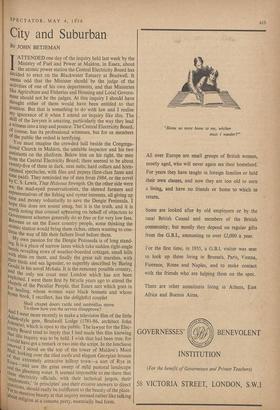City and Suburban
BY JOHN BETJEMAN ATTENDED one day of the inquiry held last week by the / Ministry of Fuel and Power at Maldon, in Essex, about the atomic power station the Central Electricity Board has decided to erect on the Blackwater Estuary at Bradwell. It seems odd that the Minister should be the judge of the activities of one of his own departments, and that Ministries like Agriculture and Fisheries and Housing and Local Govern- ment should not be the judges. At this inquiry I should have thought either of them would have been entitled to that Position. But that is something to do with law and I realise MY ignorance of it when I attend an inquiry like this. The skill of the lawyers is amazing, particularly the way they lead a witness into a trap and pounce. The Central Electricity Board, of course, has its professional witnesses, but for us members of the public the ordeal is terrifying. You must imagine the crowded hall beside the Congrega- tional Church in Maldon, the amiable inspector and his two assistants on the platform. Below him on his right, the men from the Central Electricity Board; there seemed to be about twenty-five of them in dark, neat suits, hard collars and horn- ,r,iinnted spectacles, with files and papers (first-class fares and by paid). They reminded me of men from 1984, or the novel °Y C. S. Lewis, That Hideous Strength. On the other side were we, the mad-eyed preservationists, the shrewd farmers and representatives of the fishing and oyster interests, all giving up time and money voluntarily to save the Dengie Peninsula. I hope this does not sound smug, but it is the truth, and it is worth noting that counsel appearing on behalf of objectors to _Government schemes generally do so free or for very low fees. -Between us sat the Essex country people, some thinking the atomic station would bring them riches, others wanting to con- tinue the way of life their fathers lived before them. My own passion for the Dengie Peninsula is of long stand- ;rig. It is a place of narrow lanes which take sudden right-angle bends revealing rows of weather-boarded cottages, small hills *vs:1th elms on them, and finally the great salt marshes, with illeir birds and sea lavender, so superbly described by Baring Gould in his novel Mehala. It is the remotest possible country, and the only sea coast near London which has not been exploited. I went there first by bicycle years ago to attend the `,,naPels of the Peculiar People, that Essex sect which goes in 1,°I. healing, whose women wear black bonnets and whose aYtnn book, I recollect, has the delightful couplet Shall chapel doors rattle and umbrellas move To show how you the service disapprove? And Ada I _Went more recently to make a television film of the little , nt style gem,. Bradwell Lodge (1781-86, architect John ',r()ihilson), which is open to the public. The lawyer for the Elec- th,citY Board tried to imply that I had made this film knowing t this inquiry was to be held. I wish that had been true, for j ca mould have got a remark or two into the script. In the luncheon y,e„rval I stood on the top of the tower of Maldon's Moot of"1,1, looking over the tiled roofs and elegant Georgian houses Essex.—and extremely attractive hilltop town—a sort of Rye in iin,,' ex—and saw the great sweep of mild pastoral landscape iiieus the gleaming water. It seemed impossible to me there that implements,' e, electricity officials, with their technical jargon, their tir,"e,..t,,itons e.nlents,"in principles' and their evasive answers to direct . should really be indifferent to the beauty of the place. 4b,..I mention beauty at that inquiry seemed rather like talking uut religion at a canasta party, essentially bad form.










































 Previous page
Previous page